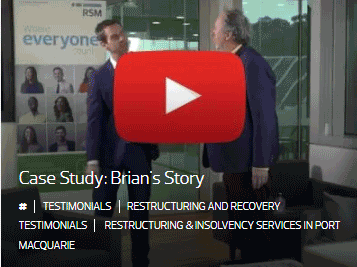100+ YEARS IN AUSTRALIA: RSM started in 1922 as a husband-and-wife team selling bookkeeping systems.
LOCAL EXPERTS: We have 32+ offices around Australia and many more locations serviced remotely.
Liquidation Services | Insolvent Company Solutions
Explore RSM Australia's expert liquidation services, assisting unsecured creditors, secured creditors, and insolvent companies through creditors voluntary liquidation, court liquidation, and effective management of company assets, books and records, and employee entitlements.
At RSM Australia, we offer comprehensive liquidation services to help manage the complexities of this challenging process.
What is liquidation?
Liquidation is the “closing down” or “winding up” of a company.
It’s different to bankruptcy and personal insolvency, which only applies to individuals.
Under the Corporations Act 2001, a company must be liquidated if it becomes insolvent. This means it can’t pay its debts as and when they are due.
If a company trades while it is insolvent (and does not apply for safe harbour ), the director(s) may be held personally liable for debts the company incurs while it’s insolvent but still trading.
Contact our Liquidation specialists

Why Choose RSM?
- Expert Guidance: Our team has extensive experience in handling bankruptcy cases, providing you with reliable and knowledgeable support.
- Personalised Solutions: We offer tailored solutions that address your unique financial situation and goals.
- Holistic Approach: Our comprehensive services ensure that all aspects of your financial recovery are addressed.
GET IN CONTACT
Entering liquidation is a critical decision, but with expert guidance, it can pave the way for resolving financial difficulties. Contact RSM today to learn more about our comprehensive liquidation services and how we can support you through this process.
GET IN CONTACT
Entering liquidation is a critical decision, but with expert guidance, it can pave the way for resolving financial difficulties. Contact RSM today to learn more about our comprehensive liquidation services and how we can support you through this process.
Registered Liquidator
A registered liquidator is a person who is registered as a liquidator under the Corporations Act 2001.
They are allocated a Registered Liquidator Number and their name and number appear on ASIC's Register of Liquidators.
At RSM, we have a number or registered liquidators ready to support your needs.
Registered Liquidators in Western Australia
Registered Liquidators in New South Wales
Registered Liquidators in Canberra
Registered Liquidators in Queensland
Registered Liquidators in Victoria
Frequently asked questions
How can RSM help with liquidation?
Our restructuring and recovery team are liquidation experts, and registered liquidators.
If a company owes $2,000 or more, the person or entity it owes can pursue legal action to force it into liquidation.
When a company is forced into liquidation, the director(s) have no control over who is appointed as liquidator. There may also be a wait of up to two to three months for a court hearing. In that time, director(s) cannot choose to enter voluntary liquidation.
Voluntary liquidation is when the director(s) and shareholders choose to put the company into liquidation. With agreement from shareholders, director(s) select a registered liquidator and hand over control of the company. There is usually no need to get a lawyer or go to court.

THE REGISTERED LIQUIDATOR WILL:
- Deal with all company creditors
- Identify, collect and sell assets for the benefit of creditors
- Where possible, pay creditors in line with the Corporations Act
Voluntary liquidation is different to voluntary administration. Administration is when the company attempts to repay its debts through a formal proposal with creditors.
The goal of administration is to offer creditors a better return than liquidation, with a view to keeping the company trading. Liquidation usually means the company closes.

In the liquidation process, both unsecured creditors and secured creditors play crucial roles. Secured creditors have a claim over specific company assets, while unsecured creditors have no such claim. We provide expert guidance to ensure both parties understand their rights and entitlements throughout the liquidation
Liquidation can occur through creditors voluntary liquidation or court liquidation. In a creditors voluntary liquidation, the company's shareholders decide to wind up the company. In contrast, a court liquidation happens when a liquidator is appointed by the court. Our experienced team can assist with both types of liquidation, ensuring compliance with all legal requirements.
When a company is declared insolvent, it means it cannot pay its debts. Our role is to manage the insolvent company's assets and debts, ensuring an orderly liquidation process. We oversee the company's books and records to ensure all financial transactions are accurately documented.
When a liquidator is appointed, they take control of the insolvent company’s affairs. This includes managing company assets, books and records, and overseeing the sale of assets. Our team at RSM Australia has extensive experience in liquidator appointments, ensuring a smooth and efficient process
Accurate management of company assets and maintenance of books and records are essential during liquidation. We ensure that all assets are properly identified, valued, and sold to achieve the best outcome for creditors. Additionally, we maintain meticulous records to support the liquidation process.
One of the liquidator’s key responsibilities is the sale of assets. The proceeds from these sales are used to repay creditors. Our expertise ensures that the assets are sold at market value, maximizing the return for creditors. We also ensure that creditors receiving payments are treated fairly and in accordance with legal requirements.
Employees of an insolvent company are often concerned about their entitlements, including annual leave. We ensure that all employee entitlements are calculated accurately and paid out in accordance with legal obligations.
Our team of professionals at RSM Australia offers tailored, professional advice to guide you through the liquidation process. We understand the complexities involved and are committed to providing clear, actionable guidance to help you navigate this difficult time with confidence.
There are many signs that a company is insolvent, such as:
- Not enough cash to pay debts
- No way to raise extra funds
- Cannot pay tax debt
- Unable to pay wages and entitlements
If you run a company that is showing these signs, it’s important to seek advice immediately. The faster you take action, the more opportunity you have to minimise your personal risk and exposure.

























